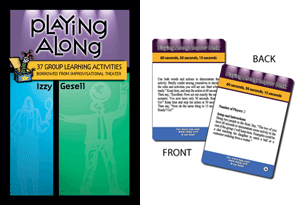Does Improv really help in the workplace?

Izzy Gesell
By Izzy Gesell
How much relevance do Improv Theater techniques have to our daily professional and personal lives? Whether you are a teacher, coach, corporate executive, sales representative, stay-at-home mom, blue-collar worker or professional speaker, you will find Improv to be intuitive, fascinating and immediately applicable to what you face on a day-to-day basis. This blog is directed toward individuals who desire to become more confident, playful, spontaneous, and effective.
People Assess Your Value/Reputation Based on How Your Actions Impact Their Emotions.
Early on in my programs, I invite a volunteer to come up and learn an Improv game. Generally, there are very few takers. I then ask for some of the folks who hadn’t volunteered to share what thinking they went through that kept their hands from going up. The reasons are many. Among the most common answers are: “I don’t want to look foolish,” “I don’t know what the game is about”, “I don’t like to be first”, and “I was taught never to volunteer.”
Eventually, someone does volunteer. As the
person comes up, I ask the people sitting in the audience how they feel now that someone had volunteered. Most of the comments are about much relief was felt, how relaxed they now were able to be, and how grateful they were to the volunteer for stepping up. In other words, the person who stepped up had the power, through his or her action, to transform the emotional climate for the whole group. The volunteer thereby gains a very high status in the group. A status gained not by a conscious effort to be liked, but by a desire to volunteer to play for whatever personal reason. And the entire group took note!
IMPROV TECHNIQUE TO PRACTICE: Trying to figure out what’s right or best or most creative or most helpful or most controlling is futile in Improv. The only way through is to be spontaneous, authentic and expeditious in your actions. Make your statements or actions flow from what you want to do. Whenever you notice yourself attempting to figure out what someone else needs or desires, bring your focus back to what you want or need to do.
HERE’S WHY IT WORKS: In life, once you know that others are watching you and judging you based on their own feelings, you realize you may as well act on your own beliefs and desires. Do what you want to do and how you want to do it. There is a saying that “nature knows neither right nor wrong, only consequences”.
Since it is futile to try and figure out how to please all others or what they are expecting, you may as well do what you believe is right. If you fail, at least you fail with your own truth. Living your own truth is the simplest way to being authentic in your life.
IMPROV GAME TO PLAY: “What Are You Doing?”
Players learn to focus on what is actually happening rather than what is being said.
Goals:
- Use improv to separate action from discussion.
- Use improv to allow mind and body to operate separately.
Group Size: 2 players at a time.
Time: 5 to 10 minutes
Process:
- Introduce the goals of the exercise to participants. Select two players from the group and bring them to the stage.
- Describe the game as a combination of contradictory words and actions.
- Determine who will be Player 1 and who will be Players 2. Provide the following instructions to the two players:Player 1 will mimic a physical action, such as writing a letter, while Player 2 asks, “What are you doing?” Player 2 responds by naming some other activity, such as “I’m washing the car.” Player 2 then acts out washing a car. Let’s begin.
- Player 1 begins to pantomime a physical action, such as bouncing a ball.
- Player 2, after Player 1 starts the action, say “What are you doing?”
- Player 1, continues the action but answers the question by naming an activity different from what you are actually doing. For example, “I’m brushing my teeth.”
- Player 2, immediately begin miming the action Player 1 stated, not the activity Player 1 is doing. In this case, begin brushing your teeth.
- Player 1, it is now your turn to ask, “What are you doing?”
- Player 2 responds with something other than “brushing my teeth” such as “I’m digging a ditch.”
- Player 1, act out digging a ditch as Player 2 asks, “What are you doing?”
- Player 1, answer with an activity other than digging a ditch, such as, “I’m reading a book.”
- The objective is to answer smoothly and without hesitation. The round continues until one player takes too long to answer, stutters, or otherwise flubs a response, answers with the actual activity being pantomimed, or repeats and answer.
- The audience will determine when a player is removed by an agreed upon method such as shouting “out”.
- A player who is “out” leaves the stage and is quickly replaced by another volunteer player.
- The player who remains becomes Player 1 and starts a new action.
- Quick responses are necessary. The secret to success is to separate thought from action. You can act by just moving a body part. A tongue wiggle or a hand twitch is fine. Remember, you don’t have to explain what it is. To answer the question, “What are you doing?” look around the room (I’m sitting in a chair; I’m holding a pencil; I’m writing on a flip chart) or think about something in your past (I’m getting my diploma; I’m proposing marriage.)
- After a predetermined time limit is reached, reconvene the group and lead a closing discussion using the following questions:
- What made this game fun?
- What made it easy for you to volunteer?
- What made it difficult for you to volunteer?
- What happens in an organization or relationship when what is said is not in alignment with what is being done?
Variation:
The game can be played with a group arranged in a circle or line. Player 1 starts the action, and Player 2 asks, “What are you doing?” Player 1 responds. Player 2 turns to Player 3 and acts out Player 1’s response. Player 3 asks, “What are you doing?” and so on until everyone has had a chance or time is up.
Go here for a printable version of “What are you doing?”

